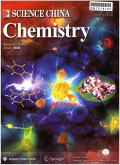- 钛学术文献服务平台 \
- 学术期刊 \
- 基础科学期刊 \
- 自然科学总论期刊 \
- 中国科学:化学(英文版)期刊 \
Crystallinity and stability of covalent organic frameworks
Crystallinity and stability of covalent organic frameworks
基本信息来源于合作网站,原文需代理用户跳转至来源网站获取
摘要:
Covalent organic frameworks (COFs) are a class of organic porous polymers with high crystallinity,and their structures can be precisely tailored via topology design.Owing to the characteristics of permanent pores,periodic structures and rich building blocks,COFs have triggered tremendous attention in the past fifteen years and are extensively investigated in various fields.Crystallinity and stability are two crucial features for practical applications.In general,these two features are contradictory for COFs formed via dynamic covalent chemistry (DCC).High thermodynamic reversibility is usually required to attain exceptional crystallinity of COFs,often resulting in limited stability.The first two reported COFs are based on the boroxine and boronate ester linkages,which are unstable in water and even in humid conditions.Therefore,many researchers doubt the stability of COFs for real applications.Actually,in these years,various novel linkages have been developed for the construction of COFs,and numerous newly synthesized COFs are robust towards strong acid/base and even some of them can resist the attack of strong oxidizing and reducing agents.In this review,we focus on the linkage chemistry of the COFs in terms of crystallinity and stability,further extending it to the investigation in the mechanisms of the crystal growth and the overall regulation of the contradiction between stability and crystallinity.The strategies for improving the crystallinity,including selecting building units,introducing non-covalent interactions and slowing nucleation and growth rate,are described in the third section,while the methodologies for increasing the stability from the viewpoints of chemical modification and non-covalent interactions are summarized in the fourth section.Finally,the challenges and perspectives are presented.

推荐文章
Effects of slope position and land use on the stability of aggregate-associated organic carbon in ca
Soil organic carbon
Aggregate fraction
Land use
Slope position
Karst
Southwest China
Effect of Zn deficiency and excessive bicarbonate on the allocation and exudation of organic acids i
Adaptation
Excessive bicarbonate
Organic acids
Organs
Root exudates
Zn deficiency
The contribution of bacteria to organic matter in coal-measure source rocks
Coal-measure source rocks
Organic matter type
Bacteria
Monomethyl alkanes
Alkyl cyclohexane
CO2 emission and organic carbon burial in the Xinanjiang Reservoir
The Xinanjiang Reservoir
Carbon emission
Sediment
Carbon retention
内容分析
关键词云
关键词热度
相关文献总数
(/次)
(/年)
文献信息
| 篇名 | Crystallinity and stability of covalent organic frameworks | ||
| 来源期刊 | 中国科学:化学(英文版) | 学科 | |
| 关键词 | |||
| 年,卷(期) | 2020,(10) | 所属期刊栏目 | REVIEWS |
| 研究方向 | 页码范围 | 1367-1390 | |
| 页数 | 24页 | 分类号 | |
| 字数 | 语种 | 英文 | |
| DOI | |||
五维指标
引文网络
引文网络
二级参考文献 (0)
共引文献 (0)
参考文献 (14)
节点文献
引证文献 (0)
同被引文献 (0)
二级引证文献 (0)
2003(1)
- 参考文献(1)
- 二级参考文献(0)
2011(2)
- 参考文献(2)
- 二级参考文献(0)
2012(2)
- 参考文献(2)
- 二级参考文献(0)
2013(3)
- 参考文献(3)
- 二级参考文献(0)
2014(1)
- 参考文献(1)
- 二级参考文献(0)
2015(3)
- 参考文献(3)
- 二级参考文献(0)
2016(2)
- 参考文献(2)
- 二级参考文献(0)
2020(0)
- 参考文献(0)
- 二级参考文献(0)
- 引证文献(0)
- 二级引证文献(0)
引文网络交叉学科
相关学者/机构
期刊影响力
中国科学:化学(英文版)
主办单位:
中国科学院
出版周期:
月刊
ISSN:
1674-7291
CN:
11-5839/O6
开本:
16开
出版地:
北京东黄城根北街16号
邮发代号:
创刊时间:
1950
语种:
eng
出版文献量(篇)
4060
总下载数(次)
0
总被引数(次)
11421
期刊文献
相关文献
推荐文献
- 期刊分类
- 期刊(年)
- 期刊(期)
- 期刊推荐
力学
化学
地球物理学
地质学
基础科学综合
大学学报
天文学
天文学、地球科学
数学
气象学
海洋学
物理学
生物学
生物科学
自然地理学和测绘学
自然科学总论
自然科学理论与方法
资源科学
非线性科学与系统科学
中国科学:化学(英文版)2022
中国科学:化学(英文版)2021
中国科学:化学(英文版)2020
中国科学:化学(英文版)2019
中国科学:化学(英文版)2018
中国科学:化学(英文版)2017
中国科学:化学(英文版)2016
中国科学:化学(英文版)2015
中国科学:化学(英文版)2014
中国科学:化学(英文版)2013
中国科学:化学(英文版)2012
中国科学:化学(英文版)2011
中国科学:化学(英文版)2010
中国科学:化学(英文版)2009
中国科学:化学(英文版)2008
中国科学:化学(英文版)2007
中国科学:化学(英文版)2006
中国科学:化学(英文版)2005
中国科学:化学(英文版)2004
中国科学:化学(英文版)2003
中国科学:化学(英文版)2002
中国科学:化学(英文版)2001
中国科学:化学(英文版)2000
中国科学:化学(英文版)2020年第9期
中国科学:化学(英文版)2020年第8期
中国科学:化学(英文版)2020年第7期
中国科学:化学(英文版)2020年第6期
中国科学:化学(英文版)2020年第5期
中国科学:化学(英文版)2020年第4期
中国科学:化学(英文版)2020年第3期
中国科学:化学(英文版)2020年第2期
中国科学:化学(英文版)2020年第12期
中国科学:化学(英文版)2020年第11期
中国科学:化学(英文版)2020年第10期
中国科学:化学(英文版)2020年第1期

 免费查重
免费查重










